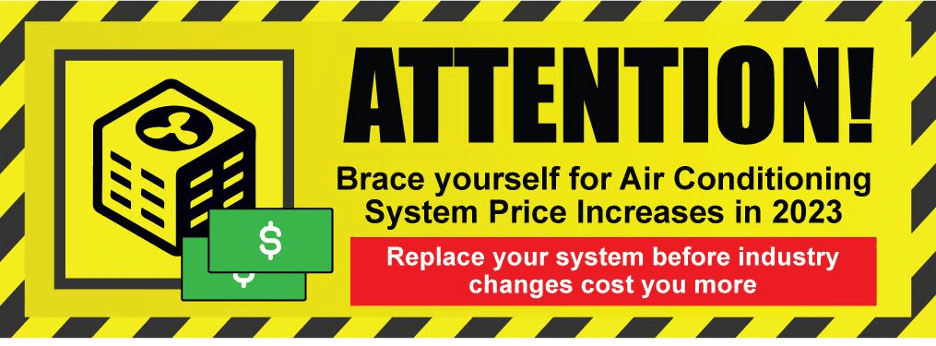This year, April 22 is Earth Day. It’s a yearly reminder to make a difference by actively participating in your local and global environment. Over one billion people worldwide will celebrate Earth Day in over 190 countries—all with the goal of helping to make our planet a better place to live, reduce waste, and lessen pollution. Did you know that your HVAC system consumes the most energy of any system in your household? Let’s look at some actionable steps to reduce your carbon footprint.
0 Comments
 Replace your HVAC system NOW and save BIG before the new 2023 standards go into effect There has never been a better time to buy. Save on your new system before the 2023 standards go into effect. The new minimum efficiency standard required by the Department of Energy will go into effect in 2023. The minimum manufacturers can make will be 1 SEER higher for air conditioning and heat pump systems. The DOE divides the country into regions, and CES is in the southeast, requiring you to maintain regional standards. The DOE is also initiating a new and more stringent testing procedure known as SEER 2. 2022 has seen rampant inflation, and customers are price sensitive. But starting January 1, 2023, air conditioner prices are set to go up drastically. HVAC industry alerts are now warning of significant price increases for 2023. There are four reasons for this increase:
Your home’s air quality is important to the health, comfort, and happiness of your family. Replacing your house’s air filter is a simple step that can make a big difference in making a happier home.
The excessively hot temperatures we’ve been experiencing this summer have not only been uncomfortable and inconvenient, but also dangerous. Many people are unaware of how deadly heat can be. In contrast to the visible, destructive and violent nature of floods and tornadoes, heat is the “silent killer.” According to a CDC (Centers for Disease Control & Prevention) study, 8015 deaths were caused by exposure to extreme heat from 1979-2003. From 1999-2003 more people died from excessive heat than from hurricanes, lightning, tornadoes, and earthquakes combined. The CDC reports an average of 350 people a year die due to the effects of heat.
Most people don’t realize how their central air conditioner actually works. They think that an air conditioner functions by pumping cool air into their home. But your air conditioner actually removes warm air and recirculates it as cool air. An air conditioner is basically a refrigerator. It uses the evaporation of a refrigerant, like Freon, to provide cooling. A central air conditioning system includes both the cooling and heating of air and cleans the air as well as controls the moisture level.
The majority of homeowners these days understand that HVAC maintenance plays a really big role in keeping your comfort high and costs low. But what about a maintenance plan? Are there any real benefits to signing on for a long-term or yearly agreement? Follow along with the maintenance specialists at Comfort Engineered Systems while we talk about what makes joining a plan so great!
|
AuthorHVAC Experts for over 25 years. Archives
April 2023
Categories |

 RSS Feed
RSS Feed